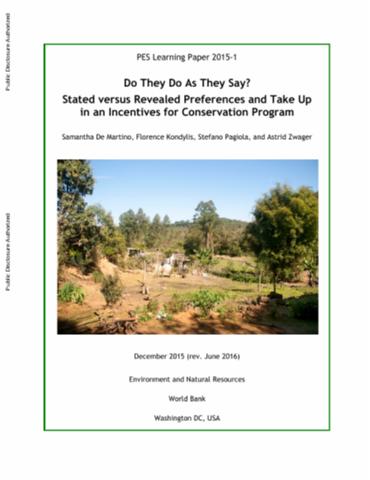Resource information
Use of conditional cash transfers has become widespread in development policy given their success in boosting health and education outcomes. Recently, conditional cash transfers are being used to promote pro-environmental behavior. While many of these Payments for Environment Services (PES) programs have been successful, it has been hypothesized that those with less favorable outcomes have been subject to low additionality, whereby landholders already conserving their land self-select into the program. Insights from the behavioral economics literature suggest that an external incentive, such as PES, has the potential to crowd in or crowd out individual behavior differentially across the initial distribution of intrinsic motivations (Frey, 1992). Thus, to increase the impact of PES, program administrators might gain from a better understanding of both the pre-existing motivations and existing baseline conservation behavior of potential participants. This paper contributes to the literature by disentangling and measuring intrinsic motivations, specifically: Pro-Environment, Pro-Social, Pro-Government, and Social Norms. Controlling for observable opportunity costs, we use these latent motivations to analyze behavioral determinants of take up for a conservation program in São Paulo, Brazil. The payments are an incentive to comply with the Brazil Forest Code. We find that Pro-Social and Pro-Environment landholders are both more likely to be conserving private land not under legal protection before the program is introduced, whereas only Pro-Social landholders are already conserving land under legal protection. With respect to enrollment in the PES program, we find Pro-Social landholders are less likely to enroll while Pro-Environment landholders are more likely to enroll. Thus we expect some level of additionality from the PES program. We discuss these findings in light of the theoretical framework on Self-Determination Theory (SDT).


